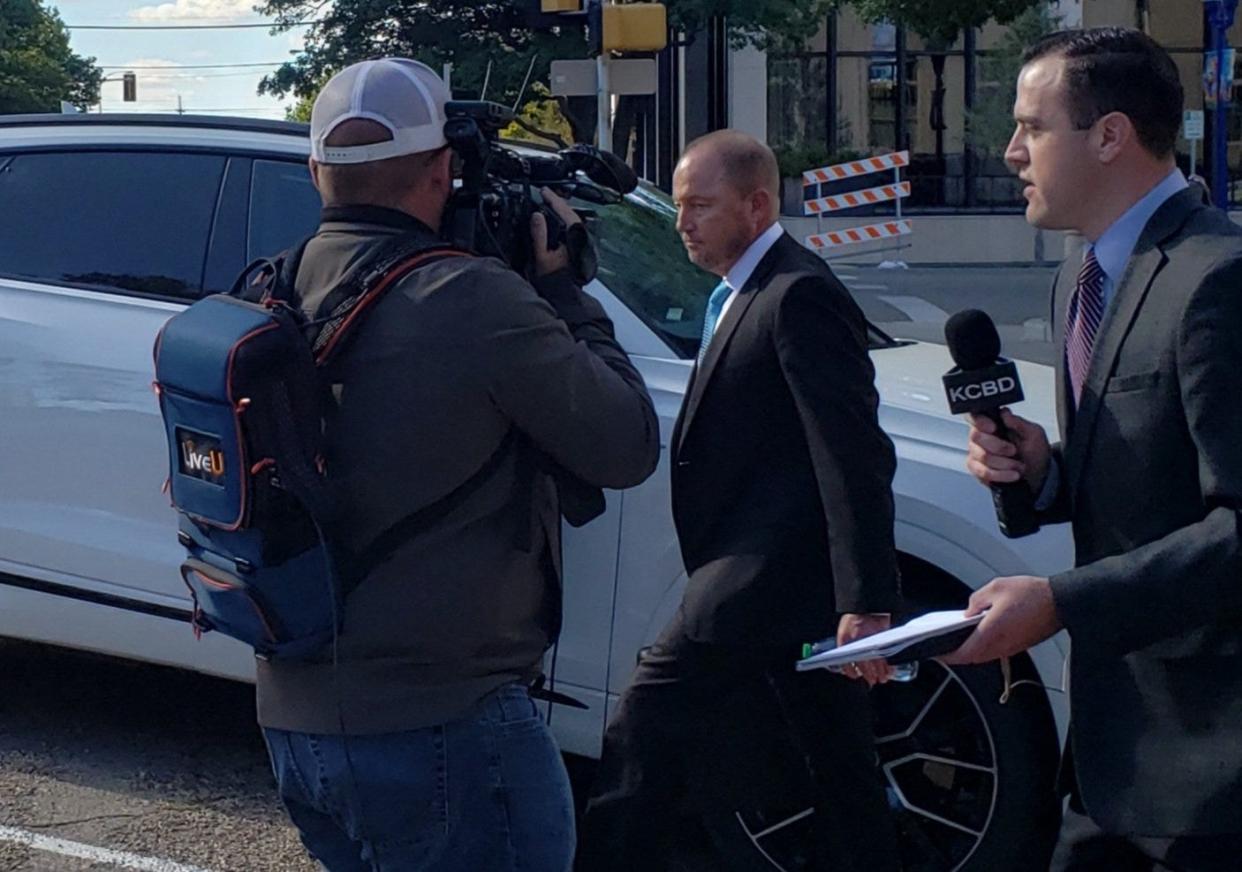Bart Reagor seeks acquittal two months after jury finds him guilty of lying to bank

Bart Reagor is renewing his challenge against the federal case against him two months after a jury in Amarillo found him guilty of making a false statement to a bank that gave him a $10 million business loan.
Reagor is set to appear on Feb. 24 before a federal judge in Amarillo for a sentencing hearing after a jury's Oct. 15 verdict finding him guilty of making a false statement to a bank. The offense carries a punishment of up to 30 years in prison.
Reagor was initially charged with two counts of wire fraud and one count of making a false statement to a bank and jurors only found him guilty of making a false statement to International Bank of Commerce.
How it started: Bart Reagor found guilty on 1 of 3 federal charges
However, Reagor's attorneys, in a Dec. 13 motion, is asking the court to ignore the jury's verdict and acquit him or give him a new trial. The verdict came after jurors deliberated for a day and 1/2 and indicated three times they were deadlocked.
"The evidence submitted at trial was insufficient to sustain Mr. Reagor’s conviction," the motion states.
More on the Dec. 13 motion
In the motion Reagor is restating his defense that the government failed to prove he intended to mislead International Bank of Commerce representatives into giving him the loan that was deemed working capital.
In the motion, Reagor's defense attorney Dan Cogdell argued that the government failed to clarify to jurors the definition of working capital.
During the trial, experts for the government and the defense provided jurors clashing definitions of what working capital was and the acceptable ways a business could use them.
In Reagor's case, he was accused of taking about $1.7 million of the $10 million IBC loan and he was charged with two counts of wire fraud and one count of making a false statement to a bank.
Reagor's defense attorneys said their client was taking an owner distribution from the loan, which their experts said was an acceptable business practice.
"Indeed, these experts testified that working capital is precisely the source from which owner distributions should be made," the motion states.
They pointed to the loan contract between IBC and RDAG that did not expressly forbid owner distributions.
How the trial went
During the trial, jurors were presented evidence in the form of e-mails that prosecutors believed proved Reagor's guilt.
In one of the emails, Reagor instructed then-RDAG chief financial officer Shane Smith to divert parts of the loan to his bank account and the account of his business partner Rick Dykes, who was not charged.
The defense's argument appeared to be enough to convince jurors to acquit Reagor of the wire fraud charges and instead they found him guilty of making a false statement to a bank.
Representatives from the bank told jurors they believed Reagor was going to use the money for business purposes such as paying bills and employee salaries, and not for his personal use.
Read more: Bart Reagor challenges forfeiture of more than $950,000
In another email, Reagor disclosed his plans for the IBC loan six weeks before the first installment of the loan was deposited.
"How we are going to manage this capital is 100000000% confidential between us and is not ANYONE ELSE'S BUSINESS!!!!!! NOBODY'S!!!!!!!!!!!!! NO BANKERS OR ANYONE ELSE! OUR BUSINESS! GAME ON!!!!!!!!!!!!," Reagor wrote.
Prosecutors noted that the email's recipients were Dykes, Smith and not the rest of the RDAG team members who handled the IBC loan which included two RDAG attorneys.
"Reagor included in his cabal only those who would not challenge his underhanded instructions," states the government's response to Reagor's motion for an acquittal.
However, Reagor's attorneys argued that the email showed Reagor acted under the belief that the money was part of a working capital fund from which he could take owner distributions.
A ruling on the motion has not been made yet by U.S. District Judge Matthew Kacsmaryk.
Looking ahead in the case
Meanwhile, Reagor's defense attorneys are asking Kacsmaryk for more time to review a presentencing report that threatens to raise the maximum punishment he is facing by three years.
As part of the sentencing processes, the U.S. Probation Office drafts a presentencing report containing a suggested guideline sentencing range it believes is appropriate. The guideline range is non-binding on the judge. However, in most cases, judges follow it.
Reagor's case was unrelated to the massive check-kiting and floor plan fraud schemes orchestrated by Smith to cheat Ford Motor Credit and other banks out of about $50 million. That scheme involved 15 employees who have pleaded guilty to their roles. However, Smith and Stephen Reinhart, the former RDAG legal compliance director, still await sentencing, which has been set for Jan. 20.
In a motion filed Monday to extend their deadline to object to the presentencing report, Reagor's attorneys said the report, which came in at 51 pages, linked their client to Smith's fraud scheme, exposing Reagor to a higher sentencing range.
"By including the floorplan fraud/check-kiting of these 15 other people, the report magnifies Mr. Reagor’s criminal exposure to a range of 324 to 405 months’ imprisonment," the motion reads.
This article originally appeared on Lubbock Avalanche-Journal: Reagor seeks acquittal, continues defense after wire fraud conviction

